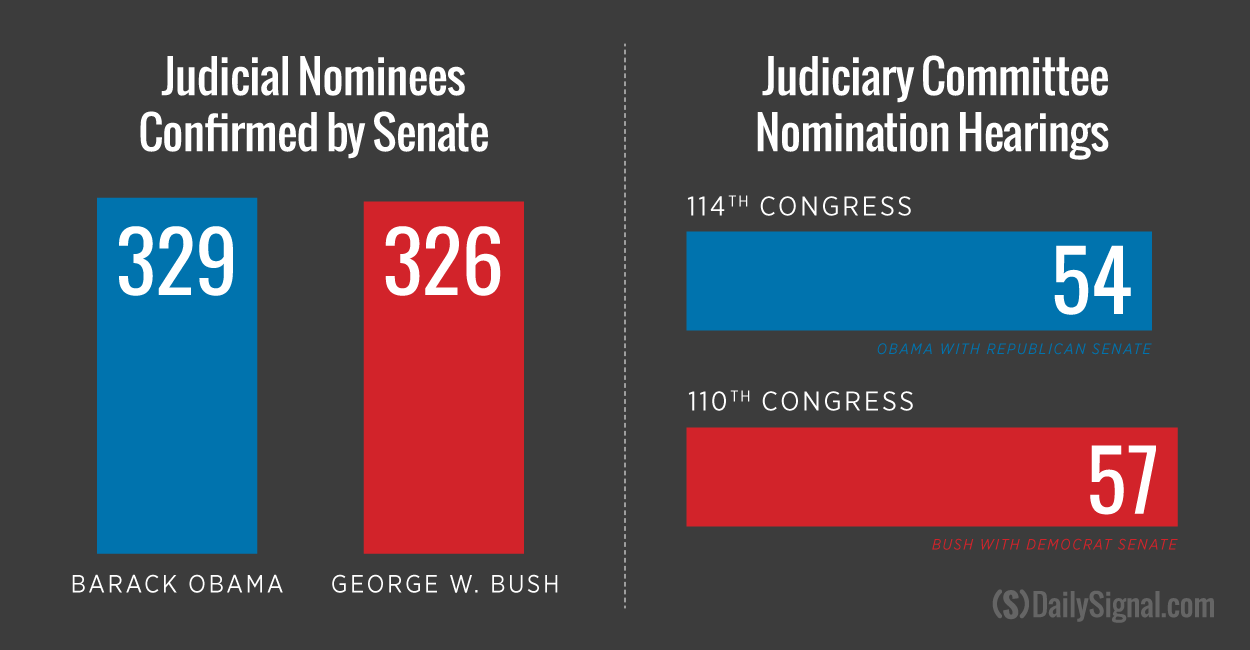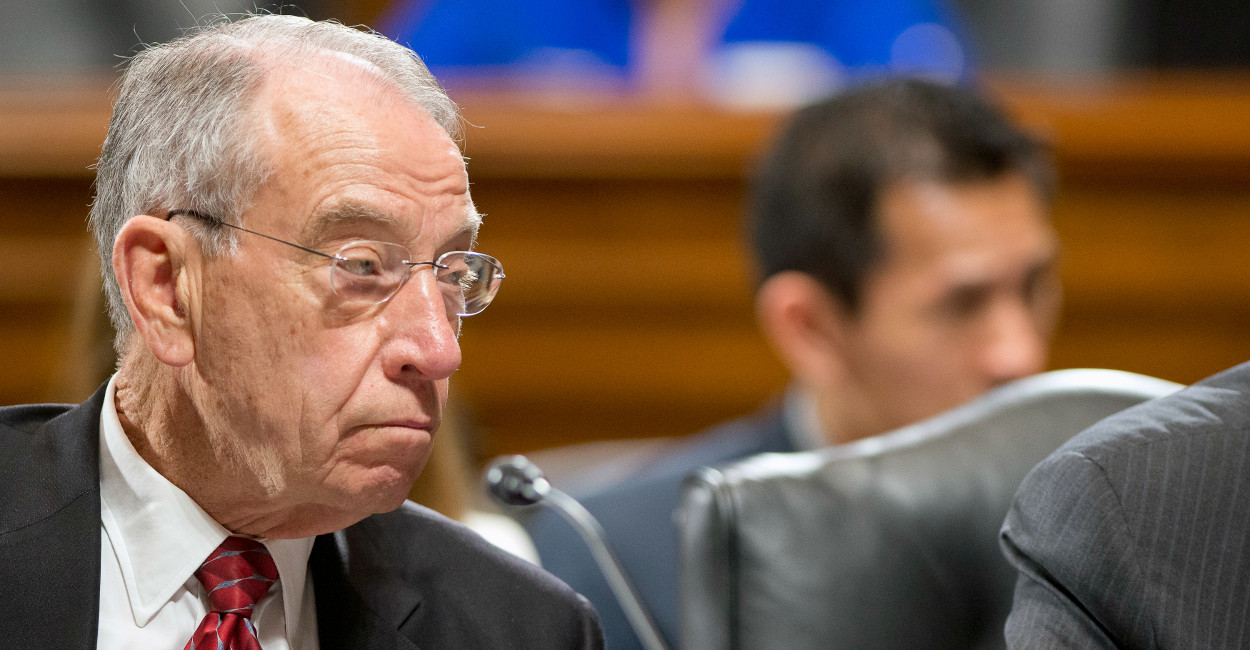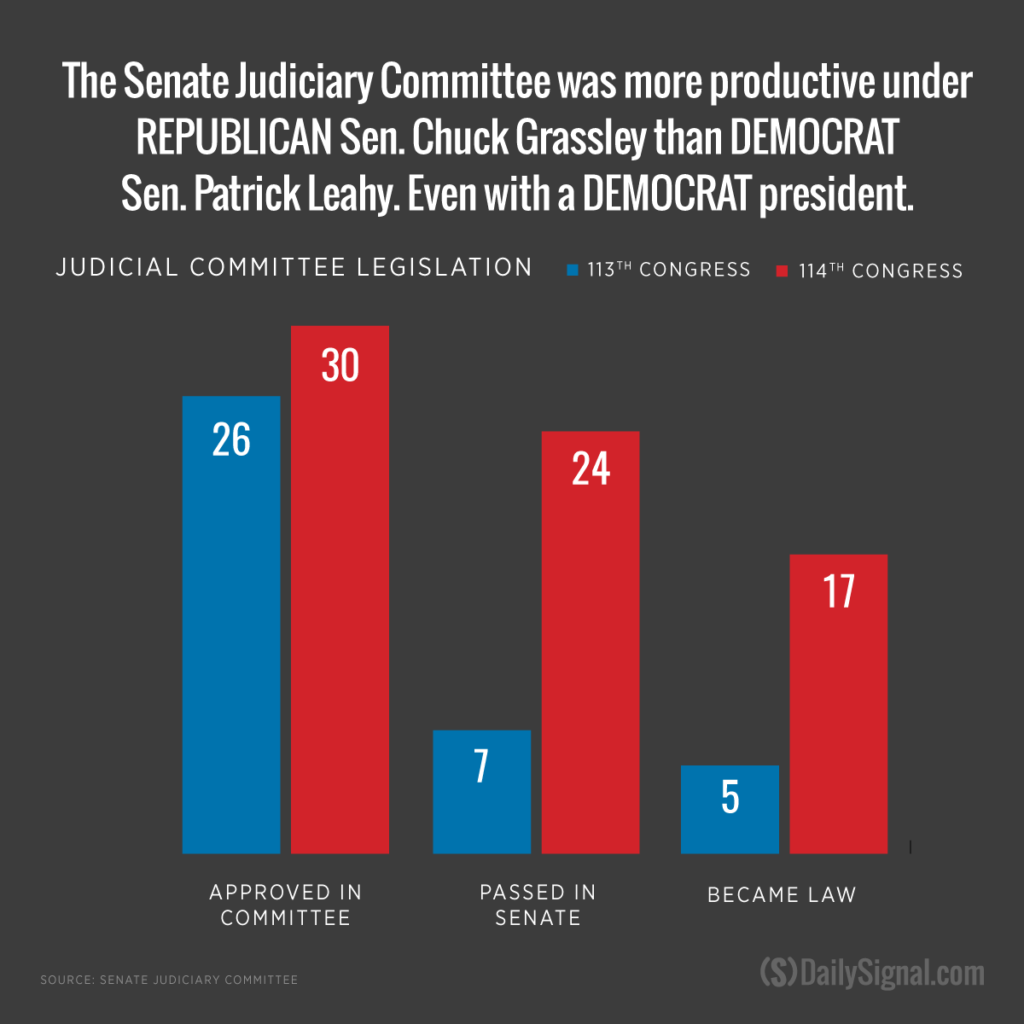So Much for the GOP
Blockade: Obama
Tops Bush on Judicial
Confirmations

Recent stories in Politico and The Washington Post paint
a picture of unprecedented obstruction by Senate
Republicans of President Barack Obama’s judicial nominees.
a picture of unprecedented obstruction by Senate
Republicans of President Barack Obama’s judicial nominees.
“Trump set to reshape judiciary after GOP blockade,”
blared Politico’s Burgess Everett on Dec. 16. Nine days
later, it was The Post’s turn. “Trump to inherit more than
100 court vacancies, plans to reshape judiciary,” wrote
Philip Rucker and Robert Barnes on Dec. 25.
blared Politico’s Burgess Everett on Dec. 16. Nine days
later, it was The Post’s turn. “Trump to inherit more than
100 court vacancies, plans to reshape judiciary,” wrote
Philip Rucker and Robert Barnes on Dec. 25.
A new report from Senate Judiciary Chairman Chuck
Grassley, R-Iowa, casts a different perspective. According
to Grassley, the committee that processes nominees
operated much the same as it did under Democrat control.
Grassley, R-Iowa, casts a different perspective. According
to Grassley, the committee that processes nominees
operated much the same as it did under Democrat control.
In fact, Obama ended up with three more judicial
confirmations than his Republican predecessor,
President George W. Bush. Obama had a Democrat-led
Senate for six of his eight years in office, while Bush
had slightly less than six due to a party-switching senator
in 2001.
confirmations than his Republican predecessor,
President George W. Bush. Obama had a Democrat-led
Senate for six of his eight years in office, while Bush
had slightly less than six due to a party-switching senator
in 2001.
It’s certainly true that Trump has a remarkable opportunity
before him to transform the federal courts. But to suggest
that Obama didn’t do the same during his eight years
simply isn’t true.
before him to transform the federal courts. But to suggest
that Obama didn’t do the same during his eight years
simply isn’t true.
Obama appointed two of the eight current members of the
U.S. Supreme Court. Justices Sonia Sotomayor (age 62)
and Elena Kagan (age 56) could spend the next 30 years
or longer shaping legal opinions during their lifetime
appointments.
U.S. Supreme Court. Justices Sonia Sotomayor (age 62)
and Elena Kagan (age 56) could spend the next 30 years
or longer shaping legal opinions during their lifetime
appointments.
Obama ended up with three more judicial confirmations than his Republican predecessor, 329 to 326.
Obama’s influence on lower courts might be even more
dramatic. The Daily Signal reported in September that
liberal judges now control nine of the 13 federal appeals
courts. That’s a staggering 70 percent.
dramatic. The Daily Signal reported in September that
liberal judges now control nine of the 13 federal appeals
courts. That’s a staggering 70 percent.
U.S. courts of appeals often wield more influence, too.
Because of the limited number of cases heard by the
Supreme Court each term, appellate judges frequently
have the last word.
Because of the limited number of cases heard by the
Supreme Court each term, appellate judges frequently
have the last word.
Obama also appointed 268 judges to U.S. District Courts—
seven more than Bush.
seven more than Bush.
In his report, Grassley noted that the Judiciary Committee
“has considered nominations at a pace similar to that of
the 110th Congress … when the Senate majority was
controlled by a different political party than the White House.”
“has considered nominations at a pace similar to that of
the 110th Congress … when the Senate majority was
controlled by a different political party than the White House.”
Here’s how those numbers compare: In the current
114th Congress, which Republicans control, Obama’s
nominees had 54 hearings, compared to the committee’s
57 hearings for Bush during the 110th Congress.
114th Congress, which Republicans control, Obama’s
nominees had 54 hearings, compared to the committee’s
57 hearings for Bush during the 110th Congress.

Senate Judiciary Chairman Chuck Grassley noted the similarities between the
114th Congress, controlled by Republicans, and the 110th Congress,
controlled by Democrats. (Photo: Ron Sachs/dpa/picture-alliance/Newscom)
114th Congress, controlled by Republicans, and the 110th Congress,
controlled by Democrats. (Photo: Ron Sachs/dpa/picture-alliance/Newscom)
Grassley cited the Senate’s constitutional responsibility to
provide a check on the president’s nominations in the
“advice and consent” clause of the U.S. Constitution. When
confirmed by the Senate, a president’s judicial nominees
serve lifetime appointments (unless they choose to retire
or are impeached).
provide a check on the president’s nominations in the
“advice and consent” clause of the U.S. Constitution. When
confirmed by the Senate, a president’s judicial nominees
serve lifetime appointments (unless they choose to retire
or are impeached).
Several of the Obama nominees Grassley shepherded
through the Judiciary Committee did so in spite of protests
from conservatives.
through the Judiciary Committee did so in spite of protests
from conservatives.
In January, Heritage Action for America, a sister organization
to The Heritage Foundation, urged the Senate to halt the
confirmation of Obama’s nominees entirely.
to The Heritage Foundation, urged the Senate to halt the
confirmation of Obama’s nominees entirely.
“President Obama has repeatedly ignored the separation
of powers over the past seven years,” said Heritage
Action CEO Michael Needham. “Given the administration’s
disregard for Congress’ role in our constitutional system of
government, the Senate should refuse to confirm any more
of the president’s judicial nominees.”
of powers over the past seven years,” said Heritage
Action CEO Michael Needham. “Given the administration’s
disregard for Congress’ role in our constitutional system of
government, the Senate should refuse to confirm any more
of the president’s judicial nominees.”
The Senate ended up confirming a total of nine Obama
judicial nominees in 2016. Not a single Obama nominee
was rejected on the Senate floor by Republicans.
judicial nominees in 2016. Not a single Obama nominee
was rejected on the Senate floor by Republicans.
Of course, the biggest confirmation battle came after the
death of Supreme Court Justice Antonin Scalia in February.
Obama nominated U.S. Appeals Court Chief Judge Merrick
Garland in March to replace Scalia. Garland never received
a Judiciary Committee hearing or Senate vote, and it’s
now President-elect Donald Trump’s opportunity to pick
Scalia’s replacement.
death of Supreme Court Justice Antonin Scalia in February.
Obama nominated U.S. Appeals Court Chief Judge Merrick
Garland in March to replace Scalia. Garland never received
a Judiciary Committee hearing or Senate vote, and it’s
now President-elect Donald Trump’s opportunity to pick
Scalia’s replacement.
In his report, Grassley also noted the Judiciary Committee’s
work beyond nominations. He cited a “commitment to
bipartisanship, an increase in productivity, and a return
to regular order” that resulted in passage of 24 bills in the
Senate, 17 of which became law—albeit not all of them
conservative.
work beyond nominations. He cited a “commitment to
bipartisanship, an increase in productivity, and a return
to regular order” that resulted in passage of 24 bills in the
Senate, 17 of which became law—albeit not all of them
conservative.
Those numbers outpace the work of the previous Congress,
when Democrats controlled the Senate and the presidency.
when Democrats controlled the Senate and the presidency.

The Senate Judiciary Committee also plays a role in
government oversight, and Grassley has given
whistleblowers a platform to report “waste, fraud, and
abuse within the federal government,” according to
the report.
government oversight, and Grassley has given
whistleblowers a platform to report “waste, fraud, and
abuse within the federal government,” according to
the report.
He also helped advance three government transparency
bills through the Senate to enactment: the FOIA
Improvement Act, the Federal Bureau of Investigation
Whistleblower Protection Enhancement Act, and the
Inspector General Empowerment Act.
bills through the Senate to enactment: the FOIA
Improvement Act, the Federal Bureau of Investigation
Whistleblower Protection Enhancement Act, and the
Inspector General Empowerment Act.
No comments:
Post a Comment
Thanks for commenting. Your comments are needed for helping to improve the discussion.